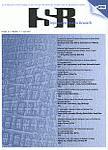版权所有:内蒙古大学图书馆 技术提供:维普资讯• 智图
内蒙古自治区呼和浩特市赛罕区大学西街235号 邮编: 010021

作者机构:Duke Univ Fuqua Sch Business Durham NC 27708 USA Stanford Univ Stanford Business Sch Stanford CA 94305 USA
出 版 物:《MANAGEMENT SCIENCE》 (信息系统研究)
年 卷 期:1999年第45卷第3期
页 面:346-363页
核心收录:
学科分类:12[管理学] 120202[管理学-企业管理(含:财务管理、市场营销、人力资源管理)] 0202[经济学-应用经济学] 02[经济学] 1202[管理学-工商管理] 1201[管理学-管理科学与工程(可授管理学、工学学位)]
主 题:Bayesian inventory management unobserved lost sales information acquisition dropping products Bayesian dynamic programming newsvendor distributions dimensionality reduction product profitability multiple markets favoring small markets
摘 要:Retailers are frequently uncertain about the underlying demand distribution of a new product. When taking the empirical Bayesian approach of Scarf (1959), they simultaneously stock the product over time and learn about the distribution. Assuming that unmet demand is lost and unobserved, this learning must be based on observing sales rather than demand, which differs from sales in the event of a stockout. Using the framework and results of Braden and Freimer (1991), the cumulative learning about the underlying demand distribution is captured by two parameters, a scale parameter that reflects the predicted size of the underlying market, and a shape parameter that indicates both the size of the market and the precision with which the underlying distribution is known. An important simplification result of Scarf (1960) and Azoury (1985), which allows the scale parameter to be removed from the optimization, is shown to extend to this setting. We present examples that reveal two interesting phenomena: (1) A retailer may hope that, compared to stocking out, realized demand will be strictly less than the stock level, even though stocking out would signal a stochastically larger demand distribution, and (2) it can be optimal to drop a product after a period of successful sales. We also present specific conditions under which the following results hold: (1) Investment in excess stocks to enhance learning will occur in every dynamic problem, and (2) a product is never dropped after a period of poor sales. The model is extended to multiple independent markets whose distributions depend proportionately on a single unknown parameter. We argue that smaller markets should be given better service as an effective means of acquiring information.